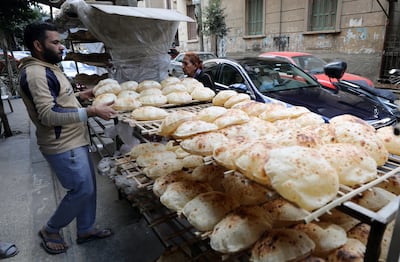Egypt has reduced the amount of subsidised sugar allowed by holders of the state ration card after its import bill increased.
The Supply Ministry said holders of the card, which can cover up to four family members, will now be able to buy 1kg of sugar per person, down from 2kg last month.
Cooking oil and rice rations will remain the same.
The reduction follows last week's increase in the subsidised prices of 31 food items at state supply outlets.
The price of 1kg of rice and sugar was raised by two Egyptian pounds, while the price of cooking oil rose by six pounds.
The price increases at state outlets was caused by a continued rise in global food prices for essential items such as grain products and cooking oil, the bulk of which Egypt imports, the ministry said last week.
Another factor was the fall in value of the local currency by around 50 per cent against the dollar, following repeated devaluations by the government last year, the ministry said.
The amount of money allocated to cardholders has stayed the same at 50 Egyptian pounds ($1.62) per person.
'Everything got more expensive'
Aziza Mohamed, 39, a mother of three, said: “I don’t really think that the ministry needed to announce a maximum on sugar this week.
“After everything got more expensive last week, most people won’t be able to afford more than a bottle of cooking oil and a bag each of rice and sugar with the 49 pounds they give us through the card.”
If holders run out of money on the card, they can buy additional items at a price that is less subsidised, but still lower than market prices.
Some cardholders are also registered in other state social welfare programmes such as Takaful, which offers financial relief to orphans and disadvantaged children, and Karama, which helps the elderly.
Ms Mohamed’s elderly mother, who is given 100 Egyptian pounds each month through her Karama card, said she had been told this month that she could no longer use her Karama card to buy rice, sugar or oil because supplies had dropped.
“All they would let me buy with the 100 pounds on my card was cheese, jam or canned tuna,” she told The National.
“These cards have become mostly useless. The only reason most people hold on to them is because they can get good cheap bread with them.”

Egypt’s domestic fuel pricing committee last week increased the price of diesel by one Egyptian pound, a rise of about 14 per cent.
Diesel is the fuel most commonly used by Egyptian bakeries.
To dispel fears that raising the price of diesel would lead to subsidised bread prices rising from 5 piastres ($0.16) for a 90g loaf, Supply Minister Ali El Moseilhy said on May 4 that the state would reimburse bakeries periodically to cover increased operational costs.
The country’s budget for the 2023-24 fiscal year showed a 41 per cent increase in funds allocated to state food subsidy programmes.
Last year, the state paid 90 billion Egyptian pounds, or $4.86 billion according to the May 2022 exchange rate. This year, it will spend 127 billion, which is $4.1 billion by the current exchange rate.


